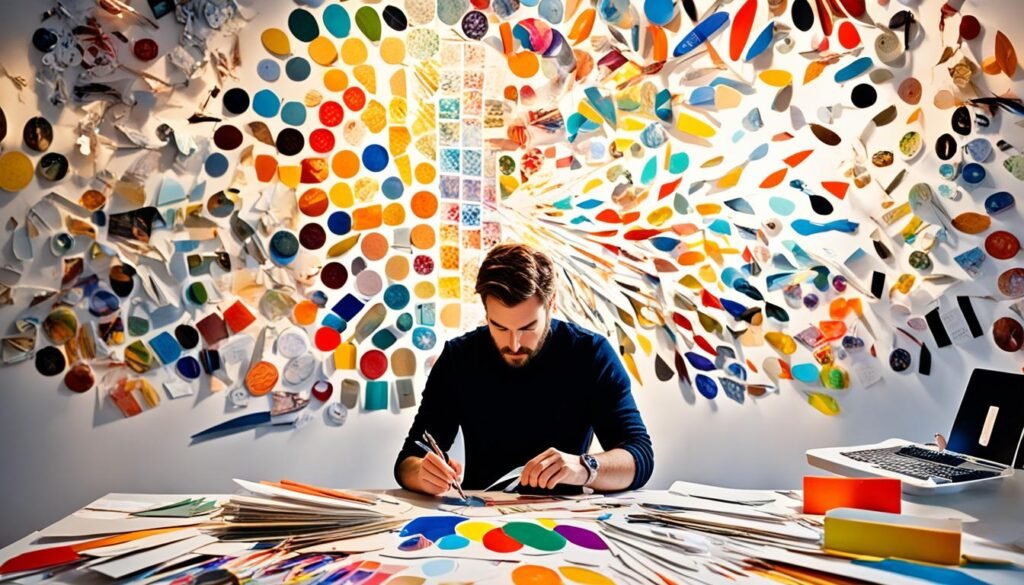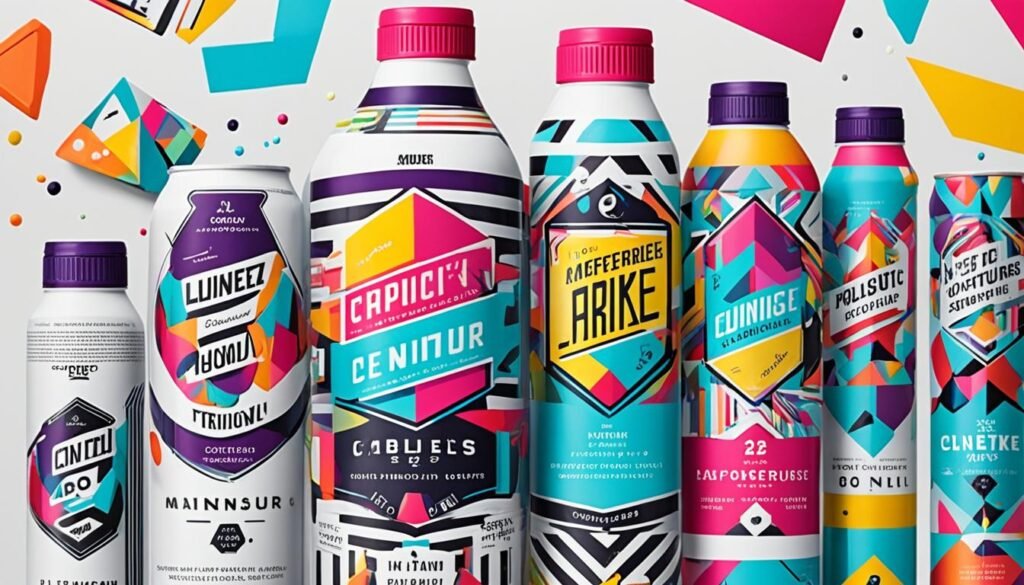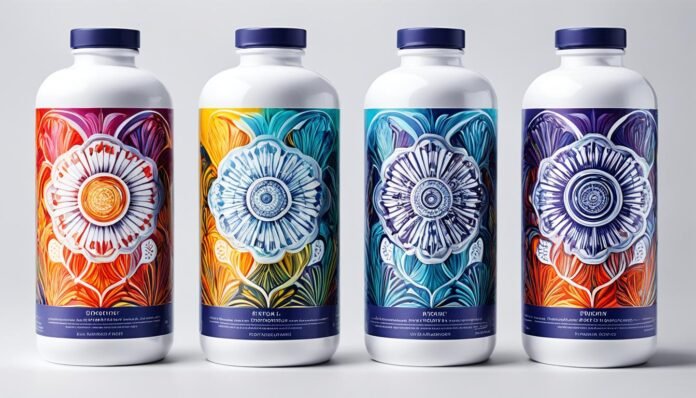Label art is a unique form of art that makes everyday product labels into stunning pieces. Artists find beauty in what most see as trash, turning simple labels into something more. They make us think about waste, art, and reusing materials in new ways. Label artists are changing how we see art, mixing everyday items with creativity. To learn more about these creative minds, check out the insights from label cutting artists.
Key Takeaways
- Label art transforms everyday packaging into stunning visual art.
- Artists leverage product labels to challenge traditional perceptions of waste.
- Creative processes in label art involve innovative techniques and styles.
- Label cutting artists promote sustainability through upcycled materials.
- The movement brings attention to broader themes of creativity and innovation.
The Fascinating World of Label Art
Label art turns everyday items into stunning visuals. It’s gained popularity, blending creativity with eco-friendliness. Artists use recycled materials to make their pieces stand out. They give new life to what we often throw away.
There are many kinds of projects in label art. Some artists make detailed collages, while others build 3D works. Their art tells stories and talks about important topics. They discuss consumer habits, who we are, and caring for our planet.
Art critics say label art is very important today. It shows how we can reuse materials in cool ways. It also starts conversations about keeping our planet safe. Now, more people enjoy and value these works in art shows.
Understanding Label Art
Label art is where creativity meets sustainability. It transforms product labels into amazing visuals. Artists cut labels from products, making the ordinary extraordinary. By selecting and arranging labels, they make stunning works that make us see art differently.
A label collage artist uses both old and new art methods. They might layer, cut, and glue to create texture and space. They use everything from scissors to digital tools to change their materials.
This art form is very adaptable. Artists mix labels with other items or paint. This blend not only makes the art look better but also tells a deeper story. It makes us think about consumerism and the value of art.
Learning about label art opens our eyes to the power of simple objects. It shows us the art in everyday life. It connects regular life to the world of art.
Who is the Artist Who Cuts Out Labels From Products to Make Art
Art today shines a spotlight on the fascinating world of label cutting artists. These artists turn simple product labels into stunning art pieces. Their work celebrates creativity and highlights everyday materials we often overlook. Each artist brings their unique background and journey to their craft, enriching the art form.
Background of Label Cutting Artists
Label cutting artists come from a mix of creative fields, including graphic design and illustration. Their diverse backgrounds let them explore new techniques, combining old and new methods. They work with materials like wood and fabric, innovating with both hand tools and modern tech like laser cutters.
Notable Works and Achievements
Many label artists have made their mark with unique and detailed works. Their art shows the beauty of labels and has been recognized in exhibitions and collaborations. They have contributed to community projects, raising awareness for reusing materials.
To learn more about this evolving art and the artists, check laser-cut art resources. This site covers techniques and artists making a difference.
Different Styles of Label Art
The world of label art is filled with vibrant styles. Techniques like collage and mixed media let artists show their creativity. Each method offers new ways for using materials and telling stories visually. Collage artists arrange labels to make stunning visuals. Mixed media artists add textures and materials, giving the art more depth.
Collage Techniques
Collage in label art means cutting and rearranging labels for an eye-catching composition. Artists pay attention to colors, shapes, and sizes. This careful planning results in art that grabs your attention and shares a story. Using recycled labels also highlights sustainability, turning everyday items into art. Here are some collage essentials:
- Layering: Multiple layers add a dynamic look.
- Contrast: Mixing different labels increases visual appeal.
- Theme: A central theme ties the artwork together.
Mixed Media Approaches
Mixed media adds depth to label art by using more than just labels. Artists can mix drawing, painting, or photography with label art. This creates artwork that pop off the page. Trying out different media helps find the perfect mix. Here’s what makes mixed media special:
- Textural Variety: Various materials mean interesting textures.
- Color Dynamics: Colors can stir emotions and set a theme.
- Expressive Forms: Combining forms leads to unique artwork.

The Impact of Recycled Label Art
Recycled label art helps raise awareness about keeping the environment safe. Artists use old materials to make beautiful and meaningful art. This art fights against waste and shows the value of recycling.
This art has a big effect on our Earth. It uses waste to cut down trash and points out recycling’s role. Artists show how changing our buying habits can help the planet. They inspire people to think about the environment in new ways.
As recycled label art becomes popular, it helps the economy too. Artists support their towns by using local materials. This cuts down on pollution and helps local talents shine.
Artists feel they are on a mission with their work. One artist said,
“Transforming waste into art helps me show others that beauty can emerge from the most unlikely places.”
Activists are excited about how this art encourages conversations. They talk about how it can change views on climate change and being responsible for the environment.
- Promotion of sustainability
- Reduction of landfill waste
- Support for local economies
- Encouragement of eco-consciousness
- Facilitation of meaningful conversations about consumption
Recycled label art does more than just look good. It brings people together to think about how we treat waste. By being creative with recycling, artists help us dream of a greener world.
Upcycled Label Art: A Sustainable Movement
Upcycled label art is at the heart of sustainability and creativity. Artists take old product labels and transform them. They turn these labels into amazing works of art. This not only reduces waste but also leads to new creative paths.
Benefits of Upcycling in the Art World
There are many good things about making upcycled label art:
- Environmental Impact: It greatly lowers the amount of waste going to landfills.
- Cost-Effectiveness: It saves money and encourages creative thinking.
- Community Engagement: Artists motivate others to think about sustainability.
- Unique Artistic Voice: Every artwork shows the unique style of its creator. It uses common products in special ways.
Examples of Upcycled Label Art
Here are some artists who excel in making upcycled label art:
| Artist | Art Piece | Medium | Description |
|---|---|---|---|
| Vicky Wright | Label Mosaic | Mixed Media | A bright mosaic made from different food and drink labels. It tells a vivid story of what we consume. |
| Maria Lopez | Fashion Statement | Wearable Art | Dresses made completely from reused product labels. This combines fashion with caring for the planet. |
| James Taylor | Collaged Portraits | Multi-Layered Collage | Expressive portraits made by layering recycled labels. They show the depth and personality of the subjects. |
Becoming a Product Label Artist
To start your journey as a product label artist, learn the crucial skills, tools, and materials needed. These artists turn labels from products into incredible pieces of art. They make ordinary packaging look extraordinary.
Key skills to develop include:
- Creativity: Coming up with unique ideas.
- Attention to detail: Being precise in cutting and arranging.
- Knowledge of color theory: Knowing how colors work together.
Necessary tools for this art form might be:
- Sharp scissors or knives for accurate cuts.
- Glues like glue sticks or Mod Podge to stick things together.
- Quality paper or canvas to place your work on.
Many ways exist to learn this art form. For eager artists, paths include:
- Structured learning through online courses.
- Hands-on experience in local workshops.
- Learning by trying things out yourself.
Building connections is vital for success. Sites like Instagram and Etsy are great for showing your work and meeting others. They help artists join a community of art lovers.
Understanding the business aspect is also key for product label artists. Important areas to consider are:
| Aspect | Considerations |
|---|---|
| Pricing | Calculate the cost of materials and your time. |
| Marketing | Use social media and local exhibits to promote yourself. |
| Sales Channels | Look into selling online and at local art events. |
Label Art in Contemporary Culture
Label art is now a big part of modern culture. It lets artists tackle big issues in society with their creativity. These artists shine a light on consumer habits, waste, and self-identity. They make art by cutting labels from products. This shows the challenges of today’s life in an innovative way.
Social media and tech are key in spreading label art. Instagram and TikTok help artists share their work with more people. They also build community support. This has led to public art installations. Here, people can see big label art pieces in cities. This changes how we see everyday items.
Label art also reflects on politics and social issues. More artists use their work to talk about the environment and buying habits. Some create art that critiques too much consumption. Or they show where thrown away products end up. Their art makes us think about our choices. It questions how buying things affects the world.

In the end, label art has grown in our culture for a reason. It shows that art is a strong way to share ideas and spark change. As artists keep exploring new paths, those who make art from labels will keep inspiring us. They help start conversations about who we are and our society.
How to Create Your Own Label Art Masterpieces
Creating label art is both fun and expressive. It’s like being an artist who makes art from cut-out labels. You’ll enjoy turning everyday things into unique pieces. Here’s how you can start making your label art.
Materials You’ll Need
- Various types of labels (from food packaging, stickers, and product labels)
- Adhesives (glue sticks, spray adhesive, or Mod Podge)
- Scissors or a craft knife
- Base materials (canvas, cardboard, or wood panels)
- Decorative elements (colored paper, markers, and washi tape)
- Sealant (clear acrylic spray or varnish)
Step-by-Step Guide to Getting Started
- Choose Your Base: Pick a sturdy surface for your collage.
- Gather Labels: Collect different labels, cutting them as needed.
- Plan Your Composition: Arrange the labels on your base first without sticking them. Try out various layouts.
- Adhesive Application: Stick each label down with your chosen adhesive after planning.
- Layering: Overlap labels and add decorative items for depth.
- Finish with Sealant: Apply a sealant to protect your finished artwork.
Exploring Label Art in Popular Media
Label art shapes popular media by connecting different forms of artistic work. It is seen in music, movies, ads, and street art. Its wide appeal shows in these areas. Innovative artists work with brands to make images that attract many people.
In music, album covers show off unique label art. This reflects what the artist is about and their message. Artists use mixed media to draw in fans. This makes listening to music a richer experience. Famous pairings with bands and fashion brands show label art’s business appeal.
Film and ads gain a lot from label art’s unique look. Ads with label art grab attention and make brands unforgettable. In films, artist contributions make the visuals pop. This close work between artists and companies creates a vibrant creative scene.
Street art is a bold outlet for label art. Cities display colorful works that speak out or share ideas. As these artists get recognized, their work starts conversations about culture and community. Metalabels bring different creators together, adding to these talks. For deeper understanding, read about label evolution here.
| Medium | Examples | Impact on Audience |
|---|---|---|
| Music | Album covers, merchandise | Increased engagement, brand loyalty |
| Film | Posters, promotional material | Enhanced storytelling, memorability |
| Advertising | Billboards, print ads | Attention-grabbing, emotional connection |
| Street Art | Murals, graffiti | Community interaction, cultural commentary |
The relationship between label art and popular media keeps growing. This shows how important label art is in our culture today. As more collaborations happen, the conversation between artists and big platforms gets stronger.
The Future of Label Art
Label art is changing and new trends are popping up. Artists are joining hands with different industries to make art on products. This could make label art even more special. People will get to see how creative everyday things can be.
Trends in Label Art Collaborations
More and more, companies and artists are working together. Brands see the benefit of having artists create their product labels. This collaboration is changing how we think about label art. Here are some key trends:
- Digital Integration: Digital platforms help artists share their work with more people. This brings new chances for them to collaborate.
- AI-Generated Art: Using artificial intelligence opens up new ways for making label art. It offers exciting methods for creating designs.
- Sustainability Initiatives: Working with green brands shows art can be eco-friendly too. It attracts those who care about the planet.
- Limited Edition Releases: Special art for product launches makes things more exciting. It creates a buzz among art lovers and shoppers.
These trends show that label art has a bright future. It’s becoming an important part of culture. And it’s making the role of artists in the art world even bigger.
Conclusion
Label art is a mix of creativity and care for the planet. It turns ordinary items into beautiful pieces and stresses the role of reuse in art. With new artists coming up, people are starting to love their fresh ideas and the stories they tell.
This art style encourages artists and fans to think about how their work affects the environment. By using upcycled materials, we can show the younger crowd how to make art that’s both pretty and green. Label art has the power to change how we view using and throwing away things.
We invite you to dive into the label art scene and find your artistic voice. It doesn’t matter if you’re experienced or just beginning; there’s a welcoming community out there. Let’s support art that not only looks good but also protects our planet for future generations.
